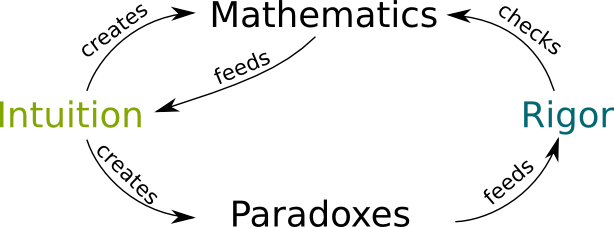The underlying principle of mathematical Intuitionism is “Trust your own ideas.” The genius of LEJ Brouwer’s system is that he realized that Mathematics is an excellent platform for illustrating how far your intuition can guide you. The intuitions we develop through our experiences of time and space are the foundations for all mathematical systems. You don’t need to spend your time memorizing other people’s rules and other people’s ideas in order to succeed.
The mathematician may be compared to a designer of garments, who is utterly oblivious of the creatures whom his garments may fit. To be sure, his art originated in the necessity for clothing such creatures, but this was long ago; to this day a shape will occasionally appear which will fit into the garment as if the garment had been made for it. Then there is no end of surprise and of delight! – Numbers: The Language of Science. p. 240
Due primarily to Formalism’s victory in the controversy, most mathematicians today view math in precisely this way. Formalists focus on the development of language tools (algorithms), while disregarding the practical question of when and where they are useful. As a result we have such abstract theoretical fields as non-Euclidean geometry and topology, with no practical applications.
David and Ellen Kaplan in their book The Art of the Infinite compare the Formalism of David Hilbert to Medieval theology:
The medieval view was that creatures-the created-glorify God; so if there were more creatures, then the greater would be the glorification. Hence if something could possibly exist, it would exist. The world-as crowded with beings as the Unicorn Tapestry-would then more loudly sing God’s praise. ln Hilbert’s terms this would translate to: since that which is consistent can exist, therefore it must. From this medieval standpoint, proving consistency would be enough to guarantee existence. Is it conceivable that Hilbert himself ever held this view? Could mathematical existence have meant this much-not this little-to him? – The Art of the Infinite, p. 51
Intuitionist mathematicians, on the other hand, view mathematics holistically within a broader social context. Mathematics is a technology, just like any other. We can greatly increase the number of “garment that fits” by identifying current problems in today’s world that can most benefit from the systematic approach that mathematics provides. Intuitionists are more open to the search for space where our mathematical language-programs can usefully operate.
Why did Formalism win out? Ernst Snapper (Dartmouth College), in his essay on the [lack of a] philosophical foundation for mathematics, has this to say:
“These three reasons [Formalism being “more elegant”, classical proofs that Intuitionists reject, and Intuitionist proofs that are classically false] for the rejection of intuitionism by classical mathematicians are neither rational nor scientific. Nor are the pragmatic reasons, based on a conviction that classical mathematics is better for applications to physics or other sciences than is intuitionism. They are all emotional reasons, grounded in a deep sense as to what mathematics is all about. (If one of the readers knows of a truly scientific rejection of intuitionism, the author would be grateful to hear about it.)” – Mathematics Magazine, p. 212
We need to teach student to “play math by ear.” What I mean is that students should learn mathematics intuitively, instead of a programmed instruction. At least, they should know that math can be done that way.
Our culture is obsessed with translating intuitive knowledge into a system of rules, but we don’t know how to translate it back the other way. We need to learn.
“To an extent intuitionism is a purely philosophical position. It becomes a foundational program for mathematics only through its attack on traditional logic, led above all by Brouwer.” “Mathematical theorems obtained by indirect proof (in particular, certain existence proofs) are, according to the intuitionist point of view, without content, since there is no mental construction that corresponds to them. They have at best a heuristic value, but should not be included in the canon of mathematical theorems. While Brouwer’s criticisms were received and discussed, his program for a new foundation of mathematics on purely intuitionist principles was pursued only at the margins. For the stock of classical theorems that would thereby have to be abandoned was too great.” – http://mathineurope.eu/sv/43-information/history-philosophy
